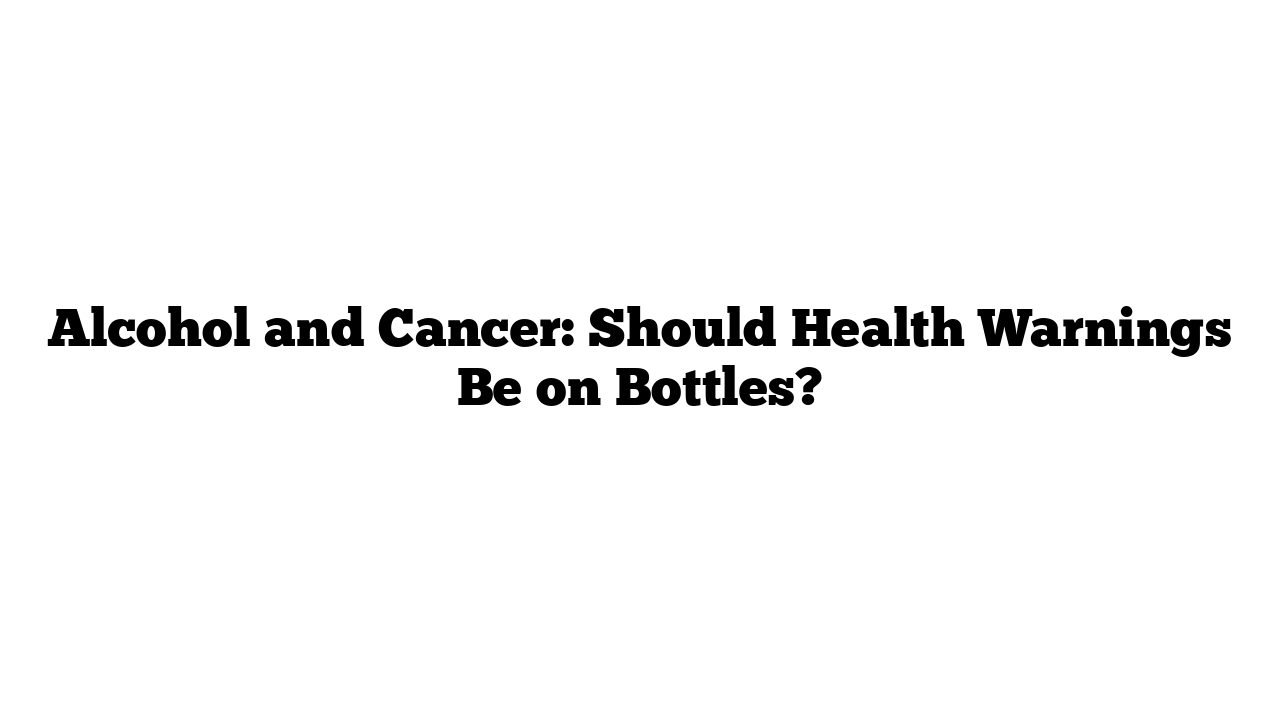Alcohol and Cancer Risk: What You Need to Know
The relationship between alcohol consumption and cancer risk has sparked significant discussions in recent years. With calls for health warnings on alcohol bottles, similar to those on cigarette packs, many are questioning whether these measures could lead to better public awareness and reduced alcohol-related health risks.
This article explores the connection between alcohol and cancer, the possibility of health warnings, and the role of policymakers, particularly in the USA.
Understanding the Link Between Alcohol and Cancer
How Does Alcohol Contribute to Cancer?
Studies reveal that alcohol is linked to several cancers, including:
- Liver cancer
- Breast cancer
- Colorectal cancer
- Esophageal cancer
The breakdown of alcohol in the body produces acetaldehyde, a toxic compound that damages DNA and prevents cells from repairing themselves. This cellular damage increases the risk of cancer over time.
Does the Amount of Alcohol Matter?
Even moderate drinking can raise cancer risk. However, heavy drinking significantly amplifies this risk. As the American Cancer Society highlights, “No amount of alcohol is completely safe.”
The Surgeon General’s Role in Addressing Alcohol and Cancer
Why Health Warnings Are Gaining Attention
In the USA, public health officials, including the Surgeon General, are advocating for clearer communication about the risks of alcohol. Adding cancer warnings to alcohol bottles could be a critical step.
What Could Health Warnings Look Like?
Health warnings might include phrases like:
- “Alcohol consumption increases cancer risk.”
- “Limit intake to protect your health.”
- “Alcohol can cause liver and breast cancer.”
Lessons from Tobacco: Why Alcohol Warnings Matter
Tobacco Warnings Set a Precedent
Graphic warnings on cigarette packs significantly reduced smoking rates worldwide. Public health experts believe similar measures for alcohol could lead to:
- Greater awareness of health risks.
- Reduced alcohol consumption.
- Better-informed decisions by consumers.
Global Examples of Alcohol Warnings
Countries like Ireland and Australia have started implementing health warnings on alcohol products. The USA may soon follow suit as public pressure mounts.
What the Research Says
Key Studies on Alcohol and Cancer
- National Cancer Institute (NCI): Research confirms alcohol is a carcinogen.
- World Health Organization (WHO): Alcohol accounts for approximately 4% of all cancer cases worldwide.
- American Institute for Cancer Research (AICR): Drinking even one glass of wine daily can raise breast cancer risk by 5-10%.
Should You Stop Drinking Alcohol?
Practical Tips to Reduce Risk
While quitting alcohol entirely is the safest choice, here are some ways to lower cancer risk:
- Limit your weekly intake to one or two drinks.
- Choose non-alcoholic alternatives for social events.
- Stay informed about alcohol’s long-term effects.
Can You Reverse the Damage?
If you reduce or stop drinking, your body may repair some of the cellular damage caused by alcohol. Over time, this could lower your cancer risk.
Public Opinion on Alcohol Warnings
Do Americans Support the Idea?
Surveys suggest mixed reactions:
- Some people believe health warnings are necessary for transparency.
- Others feel it’s an overreach by policymakers.
Balancing Awareness and Personal Freedom
Striking a balance between educating the public and respecting individual choices is key.
What’s Next? Health Warnings on Alcohol in the USA
Legislative Action
Policymakers are discussing bills to mandate cancer warnings on alcohol bottles. Advocacy groups are urging Congress to act swiftly.
Public Health Campaigns
Organizations like the CDC and American Cancer Society are working to educate people about alcohol-related risks.
For additional resources on this topic, visit medicaltimes.io.
Trusted Resources for Alcohol and Cancer Information
- American Cancer Society (cancer.org)
- National Cancer Institute (cancer.gov)
- Centers for Disease Control and Prevention (CDC) (cdc.gov)
FAQs: Alcohol and Cancer Risk
1. Is alcohol a carcinogen?
Yes, alcohol is classified as a Group 1 carcinogen by the International Agency for Research on Cancer (IARC).
2. Can moderate drinking still cause cancer?
Even small amounts of alcohol can raise cancer risk, especially for breast and colorectal cancers.
3. What cancers are most linked to alcohol?
Alcohol is most associated with liver, breast, colorectal, and esophageal cancers.
4. Are health warnings on alcohol bottles effective?
Based on tobacco warning data, they could significantly raise awareness and reduce consumption.
5. Are non-alcoholic alternatives safer?
Yes, non-alcoholic drinks do not carry the same cancer risks as alcoholic beverages.
6. Should the USA adopt health warnings on alcohol?
Many public health experts believe the USA should follow the example of countries like Ireland and Australia.
7. How can I reduce my cancer risk if I drink?
Limit intake, drink less frequently, and consider quitting entirely for maximum protection.
8. Do genetic factors influence alcohol-related cancer risk?
Yes, genetic predispositions can make some people more vulnerable to the carcinogenic effects of alcohol.
9. Are there any benefits to drinking alcohol?
While moderate drinking has been linked to heart health, the cancer risks often outweigh these benefits.
10. Where can I learn more about this topic?
Visit trusted sources like medicaltimes.io, the CDC, and the American Cancer Society.
